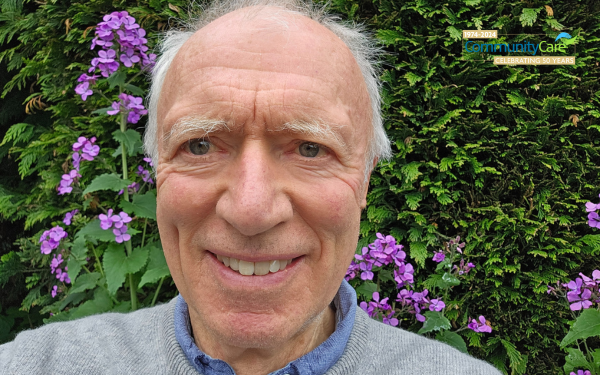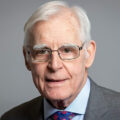
This article is part of a series of profiles of key figures who have shaped social work over the past five decades, to mark Community Care’s 50th anniversary. Previous interviewees include June Thoburn, Eileen Munro and Herbert Laming.
Since the 1970s, David Howe has been an influential figure in social work research, particularly in the areas of child abuse and neglect.
In 1995, his book Attachment theory in social work practice introduced the concept of attachment to a new audience of social workers.
He has also been one of the leading researchers and voices around the role of emotional intelligence and empathy in child protection interventions, having written books like The emotionally intelligent social worker and Empathy on the subject.
Despite retiring in 2010, his extensive body of work on social work theory, child abuse, neglect and adoption continues to be a cornerstone in social work education.
Reflecting on his 40-year career, Howe spoke to Community Care about the cost of increasing caseloads, the relevance of attachment theory, and the importance of understanding parents’ worldviews.
You started in social work around the same time as Community Care was launched, in the early 1970s. What are your memories from that time?
There was no regular magazine specifically for social workers back then. It also coincided with a time when, under the Seebohm report’s recommendation, in 1971 all social work services were combined into social services departments. I went from being a childcare officer working with children and families to a generic social worker.
We were excited and nervous about the change. Having to work with people you’d never worked with before – it was a whole new world. It was interesting, stimulating and different.
Then a few years later, I remember a colleague brought this new magazine, called Community Care, into the office and it was solely for and about social workers.
People thought it was fantastic. It wasn’t just talking about our profession but also confirming and consolidating it. It gave it legitimacy and a profile, which hadn’t been strong up to that point.
As an academic, how do you think social work education has evolved over the past decades?
I don’t think it’s changed massively – the basic content remains roughly the same. The biggest change has been social work courses having to deal with the more bureaucratic nature of social work these days.
Once the idea of targets was introduced in social work, with thresholds and requirements, it distorted practice. People’s caseloads rising massively has been a big factor as well.
If you have to work with bigger caseloads, that affects what you can and can’t do, usually for the worst.
Higher caseloads mean shorter and less personalised involvements.”
When you go into practice, the reality can be rather different to the more idealised content of the training course. That can distress people. What they’d like to do isn’t what they can do because the department has all sorts of constraints and limitations of time, money, agenda and resources. And that can hit you hard.
You’ve done extensive research into a social worker’s role within the child protection process. How have you seen thinking and practice evolve over your career?
Well, I haven’t been in touch with the sector for a while [Howe retired in 2010]. But if you cut resources, then you haven’t got the time to get an intelligent understanding of cases, particularly where there is neglect and abuse.
This is a very difficult field to work in. It can be fraught; there are children’s lives at stake.
You’ve got all sorts of issues that you’ve got to untangle and the shorter the time you’ve got, the worse it becomes. I think the separation between assessments and working with a case long-term is a bad idea.
I hear of multiple workers working the same case. So families and clients have no idea from one week to the next who will be visiting. You can’t work in this area unless you have some continuity of the relationship.
The same worker should work on the same case for as long as it takes.”
When I started in the children’s department, we could be involved with a family for years. Sometimes there wasn’t an end until the children grew into adulthood!
If you had a long-term relationship and you knew the family, you could assess the risk much more accurately.
What is the most important thing social workers should do when working with families?
Everything I’ve written boils down to, if the family feels like you are trying to understand them and their point of view, the more trust and less resistance you have from them. The less resistance you have from them, the less dangerous they are for their children and the more responsive they become.
Something I used to teach and write about is: you have to do with the parent what you want the parent to do with the child. If I understand you and what makes you behave the way that you do, and you get what I do and the way that I work, then we can connect.
Share your story

Picture: daliu/fotolia
Would you like to write about a day in your life as a social worker? Do you have any stories, reflections or experiences from working in social work that you’d like to share or write about?
If so, email our community journalist, Anastasia Koutsounia, at anastasia.koutsounia@markallengroup.com
Similarly, if I get them to understand their child, they become more available psychologically and mentally for their child, and the child develops a more thoughtful, reflective and integrated personality.
But you can’t do [this] without time and resources to allow you to build the kind of relationship that makes a child safer. Instead, you have short-term, slightly more aggressive interventions. That doesn’t help the parent connect with their child’s mind. The parent-child relationship remains more stressful.
Based on your research, how does attachment theory play a role within social work?
I wrote the book Attachment theory for social work practice in 1995, based on pioneering thinking and research within psychology. I wanted to make it accessible to social workers and was lucky enough to get hundreds of requests to give lectures and training and partake in conferences.
Any young mammal has to know where to go in times of danger, usually the parent or the attachment figure. Young, vulnerable babies over time recognise that when they feel tired or hungry or hurt, the place of safety is mum and dad.
The attachment figure, the mum or dad in this case, protects, soothes and comforts.
As they begin to make that connection in the safety of the relationship, the child learns about their own fear, their own reaction to it. These are critical experiences through which children learn to develop psychologically, particularly about the world of other people.
The most common question a young child will ask is why. Why did that man do that? You don’t just see behaviour, you want to understand the psychological state that caused it. So within the concept of a secure attachment relationship, parents begin to help their child recognise and understand the psychology behind behaviour.
If you were in a relationship with a parent who doesn’t do that with you because they’re a drug addict, abusive, neglectful or drunk, then you don’t get that explanation. So you don’t develop a psychological understanding of the world of people. Not understanding the world of people and relationships is stressful.”
The quality of early attachment relationships affects so much of the psychological development of children.
One clarification that I have to make to social workers is that children attach to parents; parents don’t attach to children. Attachment is about the vulnerable and the weak looking for safety from the protective and strong. Attachment behaviour occurs at times of distress, fear or anxiety.
When a child’s life is stressful, their attachment system is switched on. When it is switched on, you don’t have time to play and explore and be curious because you’re too busy trying to keep safe.
However, I’m bound to say some social workers get attachment theory wrong and misuse it.
In what way?
There’s a particular concept called disorganised attachment. It’s often associated with domestic abuse and neglect cases and the dynamics of it get misunderstood – I won’t get into the reasons why.
Often social workers, and even academics who write about it, misunderstand it and use it for the wrong reason and to the wrong end, particularly in court work, which makes me very cross.
Too many people think that an abused child must be showing disorganised attachment, or that disorganised attachment means there is an abused child. It’s not as simple as that. It can be misleading, it can lead you to make the wrong recommendations and decisions.
What is your hope for the future of social work?
That it continues. It just needs more resources, more time, and more space. That preventative work is given more emphasis. That more time and resources mean better social worker-service user relationships, better understandings, less stress and safer practices.
The irony is that, if you spend more – on early years provision, more practitioners, youth services – you’ll actually save money, because across the board and over the lifespan there will be fewer people making big demands on public services.
Celebrate those who’ve inspired you
For our 50th anniversary, we’re expanding our My Brilliant Colleague series to include anyone who has inspired you in your career – whether current or former colleagues, managers, students, lecturers, mentors or prominent past or present sector figures whom you have admired from afar.
Nominate your colleague or social work inspiration by either:
- Filling in our nominations form with a letter or a few paragraphs (100-250 words) explaining how and why the person has inspired you.
- Or sending a voice note of up to 90 seconds to +447887865218, including your and the nominee’s names and roles.
If you have any questions, email our community journalist, Anastasia Koutsounia, at anastasia.koutsounia@markallengroup.com
Which influential figures in social work would you like to see Community Care profile?






 Bournemouth, Christchurch and Poole
Bournemouth, Christchurch and Poole  Hampshire County Council
Hampshire County Council  Lincolnshire County Council
Lincolnshire County Council  Norfolk County Council
Norfolk County Council  Northamptonshire Children’s Trust
Northamptonshire Children’s Trust  South Gloucestershire Council
South Gloucestershire Council  Wiltshire Council
Wiltshire Council  Wokingham Borough Council
Wokingham Borough Council  Children and young people with SEND are ‘valued and prioritised’ in Wiltshire, find inspectors
Children and young people with SEND are ‘valued and prioritised’ in Wiltshire, find inspectors  How specialist refugee teams benefit young people and social workers
How specialist refugee teams benefit young people and social workers  Podcast: returning to social work after becoming a first-time parent
Podcast: returning to social work after becoming a first-time parent  Podcast: would you work for an inadequate-rated service?
Podcast: would you work for an inadequate-rated service?  Family help: one local authority’s experience of the model
Family help: one local authority’s experience of the model  Workforce Insights – showcasing a selection of the sector’s top recruiters
Workforce Insights – showcasing a selection of the sector’s top recruiters 

 Facebook
Facebook X
X LinkedIn
LinkedIn Instagram
Instagram
Love this quote ‘You have to do with the parent what you want the parent to do with the child. If I understand you and what makes you behave the way that you do, and you get what I do and the way that I work, then we can connect.’
I hope someone takes note of David’s reflections on working with children and families. His work greatly influenced my practice. And I am grateful for having met him as my tutor and that he made me think more clearly about my practice.
I think it is true to say.Social work especaicially child protection is about working with parents to establish what as happend,the impact on their own lived experience and how best to support them as this effects the children and the parents ability to recognise the impact their behaviour may be affecting the child.The ability to connect with family’s and children is no longer there.
The service is more target lead/ reactive.Knowing and putting the skills, knowledge, reflective pratice and theories into pratice is eroded and in my opinion an important part of understanding why we are involved with some family’s and not others.Having the ability to connect with a family is eroded because the service is more about crisis intervention and being seen to be doing something.The lack of time, high case loads,lack of support, time to make considered decisions is limited, having the confidence to question decision making, the eroson of resources and funding leads to the eroson of all the above pratice and more.
I ask myself whether crisis intervention as a better outcome for children and families? or whether early intervention delivers better outcomes for children when you have developed some connection with the families?
Social work is about having knowledge of the above and tailoring it to best support your individual way of practising and managers being aware of this .No two social workers pratice in the same way.
I to remember the time when you could plan your work with family’s,you had time to connect with the family and identify appropriate support and follow that support through. This enabled a level of professional understanding between the social worker,the family and children who appeared willing to open up about thier worries because they believed you were there to guide and support them make the right decisions.
That trust is no longer there. Whilst more and more demands are placed on social workers the profession will loose further credibility and social workers will not invest in the profession.(In my opinion)
Child protection social work is very complex, it requires an understanding of so many levels if human behaviour,attachment theories,departmental pratice and procedures, working with other services and professionals to secure resources and more.
Is it not therefore a service which needs the relevent funding, right employees to safeguard the most vulnerable in society.
The vulnerable are still the future of society.Social work plays a part in shaping the next generation.I do not understand why the importance of such services are not recognised and invested in!!
Great points Pauline ~ Trust and Vulnerability have though been redefined and structurally so by welfare economics, no?
Is, (in the Heideggerian sense) postmodernist thinking way out of step with the social complexity of everyday life and living?
I mean what is the ‘real’? And for that matter a ‘real-family’ and how does the notion of attachment, and especially now with the advances made in the neurobiology of attachment, show up between, say, youth justice and c&f work?
Like what’s the Ofsted clamp down on ‘supported lodgings’ really about? Youth Justice favours supported lodgings, no? Children ‘becoming’ cash cows, perhaps?
But then doesn’t Attachment theory have it’s genesis in the notions Abandonment and Anxiety of Heidegger, Keirkegaard and Husserl? You know a white male, protestant, colonial and germanic hermetic.
Depressive Realism is worth a look ~ see Julie Reshe for more on ~ rooted in Keirkegaard but not too as she is asking about the order of things; like what is family and how is it idealised?
Totally wonderful to see the amazing David Howe still full of wisdom. I remember him coming to Gloucester some years ago for a Masterclass – everyone was in awe of him !
Good to be reminded of the way social work was. Working with a family for years…tailoring involvement to the level of risk. I still remember those clients. Things didn’t always improve for the children but they were given time and it felt just, even to parents who eventually had children removed. And maybe to the children going back later to understand what happened. I’m not so sure that would be the case in later years.
Thank you for a good article and thank you to David for the excellent work.
I read this after I came out of a ‘training’ session on
“AI, the future of evidence based practice”. Working with families and trying to establish and maintain meaningful relationships over time? Pah, old fashioned social work equivalent to using a quill. No need for relationships, just follow the algorithm. Fewer social workers needed too.
Social work is blessed with scores of clever managers but not too many who are intelligent. They’ll tell you that snails move slowly, but are flummoxed if you ask them how they do this. The former is clever as it describes an observable fact but the latter requires intelligence to understand the function of mucus in a snails movement. Cleverness over intelligence is a much valued attribute in our Leaders. It even gets you nominated for an MBE.
What an excellent article with some acute reflections and real pearls of wisdom. Awesome comments as well, those who know, know! 💯
Wouldn’t remaining involved with families for years show that nothing tangible is being achieved? Social workers shouldn’t be in the lives of people for years. They should ask why things aren’t changing in the short term and make decisions accordingly. Plugging away is a sign of ineffectual social work.
I would agree,however it is not about remaining in a family’s life for years has friends, you are there on a professional basis. Is it not about having the time to establish a relationship with families inorder for the right support to be put in place?
The process is not that straight forward.It may involve early years input, if this does not work you may explore more intensive support,if that does not work you may then explore child in need process,if that does not work you have enough evidence to proceed to the child protection procedures.
In the meantime you would have gathered a clear picture about the lifestyle of the family,if there are no changes you should then be asking what the reasons are ,what the next decision should be, and the impact on the child, who is paramount in all decision making.
Social work is evidence based.
Social work today is about a quick fix.Parents,children and families do not open up about thier lived experinces withing weeks to fit in with social workers timescale/target.
but the evidence ie Utting was damning of corporate parenting? the advocacy role you speak of all but gone ~ the resource allocation now competitively constituted and often with very little to do with meeting actual needs; how many mums with children caught up in yuff stuff, on assessment, end up being recruited as volunteers or become activists? The number of social care support workers with lived experience of DV is staggeringly high, no? the thinking is outdated and the model long gone ~ has the defence approach inherent in psychoanalysis and attachment itself become so maladaptive to appear as abject horror?
What are ‘we’ trying to prove and who for? Maturama and Verela offer better theoretical and practical ways forward, no?
Corporate parenting is not the aim,is it not about having the initial support systems in place to support families before issue’s reach child protection stages.is it not the case if families have in place support systems early clues can be identified before reaching crisis point?
Advocacy roles do not exist. Resources/support does not exist to support families and children in crisis.Services that can pick up early signs of crisis is broken.Social work is complex,social work involves some understanding of human behaviour, attachment theories as well as other theories.
I remember the every child matters and working together principals (2006) where by every child had the right to achieve their full potential.What as happened to these principals?
Are they now outdated?
“The tree of knowledge “(Maturama/Verela )-Explains the importance of freedom and equality for all living organisations.The message indicates all living being deserves freedom and their needs and desires respected.
What is Social work really about now?
Hey Pauline, Utting was 1of22 in MfromR where the distinction between cp and family support were a tad closer; the reference to Maturama and Verela to signal that this stream of practice derives from Deleuze and not Freud. I am pretty crap at filling in the gaps between stuff until prompted so thank you for commenting, and at gone 10pm. I, genuinely, appreciate your efforts.
It shouldn’t need years to estaish professional relationships. A well trained social worker with good supervision and access to training and time for meangful reflection should be able to establish boundaries and trust effectively relatively quickly. The line between long term support and malaise is a thin one with the same ground is gone over for years. Social workers are not psychotherapists and shouldn’t be seduced into acting like they are. Tasks versus collaborative working with families should never be blurred. The layers of support ofcourse changes as needs and family competence changes but I humbly suggest that a conscientious social worker can work out how good parenting skills, kinship support, medical support, educational support and the like is. In my experience, I qualified in 1984, long term family involvement becomes eventually adults focused. That’s not healthy for a social worker and can be extremely crippling for a child. This isn’t about quick fix box ticking budget driven social work. It’s about detachment from the risk of being manipulated.
manipulation, embrassment and cajole are, and have been for decades, the main methods of supervision and management, no?
That is true,social workers are not psychotherapists or longterm corporate parents.
However the role does require a certain level of understanding of human behaviour in order as you have stated to prevent social workers from being manipulated by families.
This only happens with years of experince by the social worker,it can only happen as you say from good/meaningful supervision,support for social workers with time for reflective practice,time to complete strong assessments of a family’s individual circumstances,working together with other professionals to provide a robust individual package of support whether that be domestic abuse support,educational support,early years intervention.The social worker having time to connect with family’s before rushing of to the next case. This does not happen in most cases.
Social work should not be about a quick fix (you can miss clues)you can not always establish what is happening or been taking place in families home within weeks,this requires the skills of the social worker to do so even then you can not always unpick what is really happening.It also requires the social worker having access to psychological services to support the assessment process, this is only accessed when a case is in care proceedings.Is this support not then to late?
My point is, if social workers had access to the right support at the right time family’s and children may not become dependent and the intervention is much more targeted and robust.
My views are based on my experiences has a practising social worker and my own observations working with different challenges when Safeguarding Children.
We share more than we disagree about the actual work and the key supports needed to do it I think. My main point is in challenging the notion that “years” should be regarded as a positive.
there’s no doubt about the veracity of your or Roberts views, experiences and opinions, and however gained and irrespective of time served; newbies have always brought energy and vitality to the job and ‘we’ knock it out of them ~ the limits and limitations of epistemic blindness are the focus, surely?
And, this includes toxic positivity, and especially within psychoanalysis; see Julie Reshe on negative psychoanalysis and Bojan Radej on epistemic blindness in evaluation methodology.
Experience matters as does new perspectives often dismissed patronisingley as ‘naivety’ of newly qualified staff. Two should never be set up in competition to each other. The real problem in social work is that there isn’t a consensus about principles and a lack of an agreed evidence base for practice. A so claimed profession which does not have a unified core knowledge base is always going to rely on individual biases reframed as ‘social work values’. With experience we develop the antenna to understand this and to sift through the ever changing fads and identify interventions which have a chance of improving outcomes. Most of us don’t keep up with research and our training lacks the rigour to instil how important continuous learning from research is. Consequently most of us practice with our own biases, our own conviction that we are safe and effective practitioners, that somehow we do a grand job without ever really explaining how we do that. Hence we can claim short term task based social work is effective or that plugging away for “years” is the most efficacious approach. Takes your own biases and compare it to the biases of others and not see them as biases because neither can be ‘proven’ to be wrong. When social work education is woeful in preparing for practice and post qualification training almost non-existent this is what social workers develop for themselves. In a serious profession trial and error would be met with horror not celebrated.
Knowing the metonymic order of Social Work is the central issue, no ? the relationship with psychoanalysis is rooted in the idea of it’s deep connection to social justice ~ see Dan Mills on Fromm and Zizek (and rathermore pointedly is the key contribution of David Howe and others) ~ psychoanalysis is seated within Continental Philosophy which today is being sandwiched between Analytical Philosophy and Behavioural Economics, and the jam is getting thinner, right?… Christine Kerr, writes on Medium, and usefully helps show how both Analytical Philosophy and Behavioural Economics are seated in neoliberalism. Asking, about how core values show up is crucial because the saying and doing are out of whack, no? This is what Bojan Radej seeks to address (he’s from the Balkans as is Julie Reshe and Zizek ~ all trying to make sense of post war and post socialist societal transitions just as ‘we’ try to make sense of post colonial and post Brexit Britain ~ a useful read, I find, is minima moralia by Adorno, especially his prose Blackmail (incidentally, Otto Laske a life time student of Adorno and Habermas, writes intuitively on adult development using Bhaskar’s Critical Realism to avoid the negation of negation within postmodernist deconstruction) And, for what it’s worth ALL this stuff started about 1986/7 in response to Stuart Halls ‘The Great Moving Right Show’ and the Ernst Mandel/Alec Nice debate on the merits or not of market socialism. When PM Blair ditched clause4 ‘we’ were sewn-in to the market mechanism the basis of which is seated in the right wing philosophy of Peter Scruton the author of The Omega Project and key advisor to PM Thatcher. Bojan Radej attempts the articulation of the voids and voids within voids of such a centralised amalgamation of thought-forms; just saying…
I disagree that social work does not have core agreed principles. We start from seeing the person we work with and validating their truth. Anti racism, trans equality and empowerment is what our work is all about. Our autonomy to practice as we see fit is fundamental to good social work. Books don’t make social workers better. Our empathy is the most important social work skill.
If you put 10 social workers in a darkened room and asked them to define what core universal principles of social work are 3 will tell you they are depressed and constantly anxious about their workload, 2 will tell you they are great social workers because they have been doing the job for years and the other 5 will give you 27 different definitions of core principles without a single one replicating the others. None of this makes for bad social work per se but it does lay bare how little common understanding there is between social workers. If you ask 10 managers the same question 4 will tell you how supportive but tough they are at setting boundaries and the other 6 will bore you rigid about assessment forms and their brilliance at managing budgets. Providing supervision will not be mentioned. Bad sarcasm aside trying to find definitions we might all agree with is a slippery slope. Better not to unleash emotions that turn into nightmares. Being anti racist and empowering others isn’t unique to social work. Nor is empathy. Therefore they can’t be core principles unique to social work. As for autonomy to practice as one sees fit, that’s the road to disciplinaries, suspensions, dismissals and fitness to practice investigations. Be your own self defined social worker if it helps but don’t shout about it if you need your job.
brilliant … (and for self preservation of theory/practice justifications check out Michael Polyani on Indeterminacy)
Lee your description made me smile ☺ but so true.
Your response is the perfect example of how honest exchanges between colleagues and mutual support is the best way for us to be reflective practitioners and keep our spirits up through humour.
“In a serious profession trial and error would be met with horror not celebrated”. That’s it really.
‘Group Think’ is the dangerous dynamic, Samir and even when it’s intentions are in jest ~ Eliot Rosenberg covers the Dialectics of Egoism very well.
Alec,Egoism sums up social worker pratice of today for some.(Self interest is the motive of all conscious actions,)
There is no more working as a team,no more working together,respecting each others skills, knowledge or commitment.
Social work is now how will this benefit me ,it is not about having empathy or providing support.It is I expect you to hit the ground running.(In other words I do not have the time to invest in you)
These are my observation and experiences.I can further expand,however will not do so.
Uh! As said before, experience however gained and by whom ever over time isn’t the issue, is it? The relationship between ‘us’ and the wider context and working environment for doing the job is, no?
The feature articles on David Howe and others including Eileen Munroe and Ray Jones promoting, if not provoking, engagement in the subject matter but, and has been asked in the comments above “For What Purpose Social Work Today?”
The epistemic separation of object and subject, and especially the split subject showing up systemically in the creation of dualistic axioms of thought and behaviour; agency v non-agency, qualified v unqualified and theory v practice.
The ontological boundaries have been shifted and by sucessive Governments for an age, the epistemological knowhow altered and overshadowed by behavioural economics and analytical philosophy; the computational ciphers are reductionist behavioural portraits of real people’s lives, right?
I provoke ~ what happened to the BASW AGM mandated vote of no confidence in the IT kit being used throughout the sector?
All are, in essence, ethical considerations, no? The vested interests of the sector leadership are, surely, important, no? For sure, much of this has polemic qualities but it’s far from being personal.
Just saying….